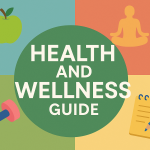Health and Wellness: Your Ultimate Guide to a Better Life
In today’s fast-paced world, prioritizing health and wellness is not just a luxury—it’s a necessity. Living a balanced life helps you maintain energy, focus, emotional resilience, and even boosts your longevity. Whether you are aiming to improve your physical fitness, mental clarity, or emotional well-being, this ultimate guide will walk you through everything you need to know to achieve holistic health.
What is Health and Wellness?
Health and wellness are often used interchangeably, but they are distinct concepts. Health typically refers to the absence of illness or injury. It’s a state where your body is functioning optimally. Wellness, on the other hand, is a proactive process of making choices that lead to a more fulfilling and vibrant life. Wellness involves physical, mental, emotional, social, and even spiritual well-being.

According to the World Health Organization (WHO), health is a “state of complete physical, mental and social well-being and not merely the absence of disease or infirmity.”
This broader definition underlines the importance of viewing wellness as an active, lifelong pursuit.
The Pillars of Health and Wellness
Understanding the core elements of wellness can help you create a balanced and fulfilling lifestyle. Here are the major pillars:
1. Physical Health
Physical health is often the first thing people think about. This involves regular exercise, a nutritious diet, adequate sleep, and proper hydration. Engaging in physical activities like walking, yoga, swimming, or strength training helps improve cardiovascular health, strengthens muscles, and boosts overall energy levels.
Eating a diet rich in fruits, vegetables, whole grains, lean proteins, and healthy fats provides your body with the nutrients it needs to function optimally. Avoiding processed foods, excessive sugar, and harmful fats plays a significant role in maintaining physical health.
2. Mental and Emotional Health
Mental health is just as crucial as physical health. Managing stress, practicing mindfulness, and nurturing positive relationships contribute to emotional well-being. Techniques such as meditation, journaling, deep breathing exercises, and seeking therapy when necessary can dramatically improve mental health.
Emotional wellness involves recognizing, accepting, and expressing a wide range of feelings effectively. Emotional intelligence—the ability to understand and manage your own emotions and the emotions of others—is a key factor for building strong relationships and achieving personal success.
3. Social Wellness
Humans are inherently social creatures. Building healthy relationships with family, friends, colleagues, and the community supports mental health and longevity. A strong social network not only reduces stress but also fosters a sense of belonging and purpose.
Volunteering, joining clubs, or simply spending quality time with loved ones can significantly boost social wellness.
4. Spiritual Wellness
Spiritual wellness does not necessarily mean religious practice (although it can for many). It’s more about finding purpose, meaning, and inner peace in life. This could be achieved through meditation, spending time in nature, engaging in creative pursuits, or practicing gratitude.
Nurturing your spiritual side helps you cope with challenges, reduces stress, and enhances your overall sense of well-being.
5. Occupational and Financial Wellness
Feeling satisfied with your work and managing your finances responsibly are two underrated yet critical aspects of health and wellness. Finding a career that aligns with your values, provides personal satisfaction, and maintains a healthy work-life balance contributes to occupational wellness.
Financial wellness, on the other hand, involves smart money management, savings, budgeting, and planning for the future. Financial stress can significantly impact mental and physical health, so developing healthy financial habits is key.
Daily Habits to Boost Health and Wellness
Creating healthy habits doesn’t need to be overwhelming. Small, consistent actions can lead to significant improvements over time.
-
Start Your Day Mindfully: Begin with meditation, stretching, or gratitude journaling.
-
Stay Active: Aim for at least 30 minutes of moderate exercise most days.
-
Eat Nutritious Meals: Prioritize whole foods over processed snacks.
-
Get Quality Sleep: Ensure 7–9 hours of restful sleep each night.
-
Hydrate Well: Drink at least 8–10 glasses of water daily.
-
Limit Screen Time: Create digital detox periods to rest your eyes and mind.
-
Stay Connected: Reach out to friends or loved ones daily.
-
Practice Self-Care: Allocate time for hobbies, relaxation, and self-reflection.
How Technology Can Help Your Health and Wellness Journey
While technology often gets a bad rap for encouraging sedentary behavior, it can also be a powerful ally in your wellness journey. Fitness apps, meditation guides, online therapy sessions, and nutrition trackers can help you stay committed to your goals.
Wearable devices like fitness trackers and smartwatches monitor your steps, heart rate, and sleep patterns, offering real-time feedback to keep you motivated.
Telemedicine platforms also make it easier to consult healthcare providers without stepping out of your home, making medical guidance more accessible than ever.
Challenges to Maintaining Health and Wellness—and How to Overcome Them
Even with the best intentions, maintaining health and wellness can be challenging. Some common obstacles include:
-
Busy Lifestyles: Lack of time for exercise or healthy cooking.
-
Mental Fatigue: Burnout from work or personal stress.
-
Unhealthy Environments: Easy access to fast food or sedentary routines.
-
Financial Constraints: Limited budget for wellness activities or organic foods.
Solutions:
-
Schedule Wellness: Treat your workouts and mindfulness practices like important appointments.
-
Practice Self-Compassion: Understand that progress, not perfection, is the goal.
-
Prepare in Advance: Meal prep and plan physical activities around your weekly schedule.
-
Use Free Resources: Free workout videos, community centers, and nature walks can be just as effective as expensive alternatives.
Conclusion: Invest in Yourself
Health and wellness are lifelong commitments. By nurturing all aspects of your well-being—physical, mental, emotional, social, spiritual, occupational, and financial—you pave the way for a more vibrant, fulfilling life.
Remember, you don’t have to make drastic changes overnight. Start small, be consistent, and celebrate every victory along the way. Your future self will thank you.









